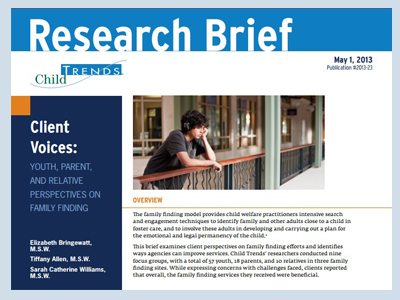Overview of Youth, Parent and Family Perspectives on Family Finding
The family finding model provides child welfare practitioners intensive search and engagement techniques to identify family and other adults close to a child in foster care, and to involve these adults in developing and carrying out a plan for the emotional and legal permanency of the child.
This brief examines client perspectives on family finding efforts and identifies ways agencies can improve services.
Child Trends’ researchers conducted nine focus groups, with a total of 57 youth, 18 parents, and 10 relatives in three family finding sites. While expressing concerns with challenges faced, clients reported that overall, the family finding services they received were beneficial.
Key findings and Implications of Youth, Parent and Family Perspectives on Family Finding
- Family can be an important source of support for youth in foster care, and family finding services can help parents mend relationships and develop support networks.
- Some parents and youth expressed distrust of family and/or hesitancy to welcome them into their lives, or had concerns that services do not focus on staying connected with family once found.
- Creating open lines of communication and building rapport are important in managing expectations and engaging clients in family finding services.
- Family finding can be a stressful, emotional process for participants; attending to clients’ therapeutic needs is important for positive outcomes.
- Caseworkers should include youth in decision-making about family finding, when possible.
Download Client Voices: Youth, Parent, and Relative Perspectives on Family Finding.

